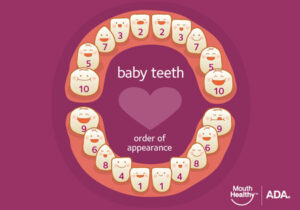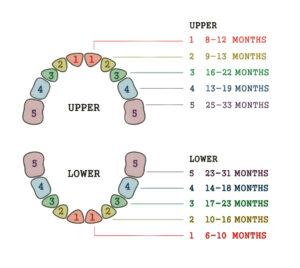February 22nd, 2023
Unfortunately yes.
We see many children as young as 1 year of age already having cavities in their mouth! Your child may have cavities starting in their teeth before it becomes a hole in their tooth. Cavities start as white spot lesions that become large and cavitated as the cavity gets worse (this is when you would usually see holes in the teeth).
Cavities are one of the most common chronic conditions of childhood in the United States. In Los Angeles County, 50% of kindergarteners have untreated cavities! Cavities are 5 times more common than asthma and 7 times more common than hay fever!
So what can we do to prevent cavities?
1) Brush 2x/day with fluoridated toothpaste for 2 minutes each time
2) Floss at least 1x/day
3) Avoid sugary foods and drinks in excess, especially crackers, chips, and juice
4) Visit the dentist at least 2x/year
Cavities are completely preventable and we believe that early detection is key! Making sure your child sees a dentist regularly will help your child's dentist identify any teeth that are starting cavities before they get worse. We are always here for you!
July 23rd, 2021

Baby teeth growing in! This is a big topic amongst parents of our youngest patients. "When should I expect the teeth to come in?" and "My other kid got their teeth by this time already but she's not growing any yet" are just some common things that we hear from parents!

The chart above shows you when we expect the different baby teeth to grow in. Usually by 3 years of age, your child should have all 20 baby teeth. BUT! The most important thing to remember is that every child is different! Not everyone gets their baby teeth in at the same time.
When pediatric dentists check your child's mouth, we are not going through a checklist to see if the teeth that are supposed to be there have come in. We are looking at the order that the different type of teeth come in, and we are feeling your child's gums to see if we can feel under the gums the baby teeth that haven't come yet.
If teeth grow in out of order, this may point to certain reasons such as: your child may be missing the tooth that hasn't come in yet, there may be something in the gums/bone that is preventing the tooth to come in, or your child's tooth is just taking its time to come in! Even if teeth grow in out of order, it isn't an immediate reason to worry!
Your dentists are always there to help answer any questions you may have and to help your child develop their beautiful smile!
February 19th, 2021
In honor of National Children's Dental Health Month, we wanted to talk about a really important topic to us. We often hear "but they're just baby teeth, do they really need to be fixed? Aren't they going to fall out anyways?" Although it is true that baby teeth do fall out and new adult teeth come in, not treating baby teeth can cause a lot more harm than we think!
What happens when we don't treat cavities in baby teeth?
- Cavities can grow really big and affect the nerve inside the tooth. When this happens, your child may start feeling discomfort and pain on that tooth. This pain affects children when they're eating and sometimes even at night when they're trying to sleep.
- After cavities start affecting the nerve of a tooth, the bacteria from the cavity may start causing an infection to form inside the bone underneath the tooth. You may see a pimple with pus on your child's gums next to the tooth with the cavity.
- If infections are left untreated, this can be really painful and potentially dangerous for your child. Infections can cause large swellings in the face and neck, and if the swellings are large enough, it can cause your child to have difficulty breathing. This becomes a really urgent emergency!
- Over time, if the infections stay in the bone around the tooth, this infection may affect the adult teeth that are developing underneath. The adult teeth may not develop normally - they sometimes become a different shape or a different color from what is normal.
- And lastly, not all baby teeth fall out at once! Most children do not lose their last baby tooth until they are 12 years old!
All of these things that can cause discomfort for your child are extremely preventable! When we treat baby teeth, we try to treat them as early as possible so that we take care of the cavities when they are still small. Our goal is to protect and save as many baby teeth as we can, because we want every child to have a beautiful and healthy smile!
May 8th, 2020
"Do we really need to take care of baby teeth? Don’t they fall out anyways?” Contrary to popular belief, children will not lose all of their baby teeth all at once. A child will start losing their first baby tooth around age 6 years, with the last one falling out of their mouth around age 12 years!
Because children will have the baby teeth in their mouth for many years of their life, it’s very important to make sure to prevent and treat any cavities that develop. Here are a few reasons why baby teeth are important:
- maintains function for proper chewing and eating
- prevents losing space in the mouth for the adult tooth to come in later on
- keeps the confidence of your child for smiling and speaking
The American Academy of Pediatric Dentistry (AAPD) recommends that a child should go to the dentist no later than 12 months of age! Pediatric dentists are always available to help you and your family maintain good oral health.




